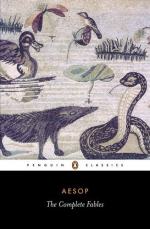|
This section contains 793 words (approx. 3 pages at 300 words per page) |

|
SOURCE: Louis Cons, "A Neolithic Saying and an Aesop's Fable," in American Journal of Archaeology, Vol. XXVIII, No. 3, July-September, 1924, pp. 276-77.
In the following essay, Cons suggests that Aesop's fable of "The Farmer and the River" descends from a neolithic saying that comments on the infrequency of finding useable stone axe-heads in a river.
In Carl Halm's collection of Aesop's Fables (Leipzig, 1863) No. 308 … ["A Woodcutter and Hermes"] (No. 44 of Corais's collection) is the story of a woodcutter who, having dropped his axe into a river, refuses to accept the gold and silver ones that Hermes offers him in exchange. He asks only to have his own restored to him, and is rewarded for his honesty by the gift of the three axes. Other woodcutters having heard of this adventure, pretend to have lost their axes in the same river, and call for an axe of gold. Hermes indignant...
|
This section contains 793 words (approx. 3 pages at 300 words per page) |

|


